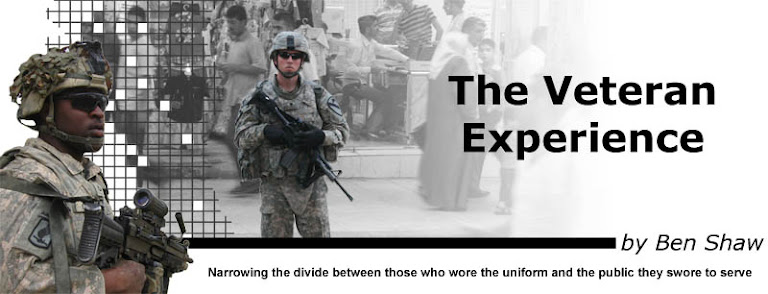Yesterday morning I received a short e-mail which, despite being but a handful of words, broke my heart: "3 KIA,6 others hurt. I need some words of wisdom." Yet I had none. Three killed? Six wounded? What am I to say? I'm not even in the military anymore. Any words I utter, however poetic or powerful, ultimately change nothing. There are still three men gone, and I cannot bring them back.
I am reminded of how I reacted when my unit sustained one killed and another wounded. I remember hearing the news from the platoon commander and walking off to sulk for a bit. I remember not wanting to be inactive, and instead investing all my energy in going down to Motor T and working with the mechanics to repair the damaged vehicle and replace the one destroyed. I remember cannibalizing a windshield off another commander's humvee, and swapping out our shattered one. I remember a friend bringing me a belt of ammunition still covered in blood and saying, "we're all going to load these in our magazines. You want some?" Two hours after the incident, we were ready to run another mission – should one have been assigned to us. The point is we didn't deal with it. We simply couldn't right then. Five years and thirteen days later, I'm not sure I have still.
A few guys cried, mostly the ones who knew the victim more closely than I, but most of us just remained silent. There weren't words to describe how we felt. We'd only been in-country for about six weeks, so we didn't have the luxury of slowing down to think about it. In truth, it had only just begun. Welcome to war. Awful things happen.
There are times when words fail completely. There are times when no single sentence or remark, however heartfelt, will change a situation and reverse or lessen the tragedy that just took place. As a Marine on deployment, I stomached it and did my job. We all did. And now on the outside looking in, I want to help, but feel impotent to do so.
When anybody suffers a loss or tragedy in the states (at least from my observations), there is a custom of calling or sending them cards to express how sorry we are for their loss. Well-intentioned though it may be it falls far short of what is needed. Others will deliver an array of casseroles and buckets of fried chicken, but it's probably more to ease their own feeling of helplessness than render any comfort. None of us knows what to do. But when words fail and actions are insufficient, one great thing remains: presence.
Presence. I may be unable to say anything of substance, but I can bring my full presence to this person. I can sit with them in silence, for at least they will not be sitting alone. They are entering a furnace. They won't like it there, and nor will I, but if I want to help, this is the only way. They are saved from going alone. Words carry little weight here, but WE carry much more.
I cannot claim to understand what it is like to suffer 3 KIA and 6 others hurt. I've had similar experiences, but every single situation is different. Similarly, everybody processes it differently. I am simply able to empathize with the sensation of devastation and loss. While I cannot put it into meaningful words, I can join them where they are. "I will go there with you," said a friend to me, and I have learned much from it.
It is pointless to recite the mantras to the effect of "you still have a mission to accomplish," or "take care of each other so it doesn't happen again." They already know these things. Their grief is at the loss of three loved ones, and the broken families they now leave behind. I can join them, and say nothing. I can show up.
Most troops will not process tragedy in full until they are far removed from those situations, so it stands to reason that their friends and families will see the grief first hand when their loved one returns. How can you help? Say nothing, but give them your full presence. This, perhaps above all else, is why attempting to overload a returning servicemember with questions and attention is so poorly received. They know you won't understand, so they don't bother trying to explain it. Nor do they seriously take comfort in your assurance that you know what they're going through. You do not. But they do respect your presence.
More than simply spending time with those in grief, you are wordlessly expressing love. You are fully there, and entirely because you wish to be. You offer no words of comfort or casseroles or flowers; you offer yourself. And this is the greatest gift you can bring.
For my friend who lost three companions, I have no words of wisdom. Nothing I can say will bring back the three fallen men or restore their devastated families. But, should our paths cross out here, I will offer myself. I will say nothing, for there is nothing to say. Better that than grieve alone. I will attend because that is the best I can do. And may every one of the three go swiftly to God.
Copyright © 2009, Ben Shaw, All Rights Reserved
<a href="http://byshaw.com">www.byshaw.com</a>
<a href=http://byshaw.com/blog>www.byshaw.com/blog</a>
2 comments:
Powerful stuff, Ben.
We all grieve differently, but we all grieve and it takes time.
You have a good handle on it. Keep it up.
Best advice I've heard for dealing with others' grief, be it here at home or in a war zone.
What a compliment that your friend felt you had the wisdom to help!
Auntie C
Post a Comment